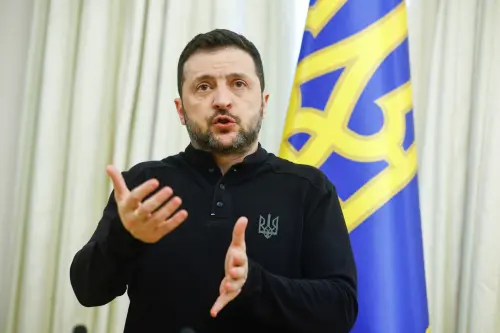KYIV/WASHINGTON, Feb 26 (Reuters) - President Donald Trump announced that Volodymyr Zelenskiy would be visiting Washington on Friday to finalize an agreement on rare earth minerals. Zelenskiy emphasized that the success of the deal would depend on these talks and continued U.S. aid.
The agreement entails Kyiv allocating some revenue to a jointly controlled fund with the U.S., as described by Ukraine's prime minister as "preliminary." This agreement is crucial for Ukraine in seeking robust support from Trump, who is eager to conclude U.S.-Russian negotiations that have excluded Kyiv so far.
Although Trump mentioned Zelenskiy signing the rare earths agreement during his visit, he hinted that Washington would not offer extensive security guarantees. Kyiv has been seeking such commitments in exchange for U.S. aid during the conflict with Russia since 2022.
"We're not going to make extensive security guarantees. We're going to have Europe do that," Trump stated. Zelenskiy stressed the necessity of security guarantees in his discussions with Trump to prevent further aggression from Russia and emphasized the significance of ongoing U.S. assistance for peace efforts.
One week ago, U.S. Speaker of the House Mike Johnson indicated reluctance for additional funding for Ukraine, following Trump's remarks labeling Zelenskiy a "dictator" and urging speedy resolution with Russia.
On guidance from Zelenskiy, focus is on ensuring that the agreement doesn’t portray Ukraine as a debtor for past military aid. Zelenskiy highlighted the importance of broader security guarantees for future stability, signaling that the success of the deal hinges on the conversation with President Trump.
Trump's claims of substantial aid to Ukraine without specific details have stirred debate as fighting persists, and he anticipates Zelenskiy's visit to sign an undisclosed agreement on Friday.
Trump has challenged existing foreign policies by engaging with Russia and continued diplomacy efforts, seen in meetings between Russian and U.S. officials, aiming at resolving conflicts contributing to the Ukraine crisis.
In a joint effort, European leaders responded to these developments with diplomatic gatherings, signaling support for Ukraine in seeking necessary security guarantees. Ukrainian Prime Minister Denys Shmyhal confirmed Washington’s endorsement to assist Kyiv in this pursuit but clarified that the U.S. made no direct security promises of their own.
Shmyhal assured the public that Ukraine would not engage in agreements that compromise its sovereignty. He outlined the terms of the agreement, highlighting Kyiv's contribution and the joint control of proceeds, emphasizing the mutual decision-making authority with the U.S. to govern the allocated fund.
